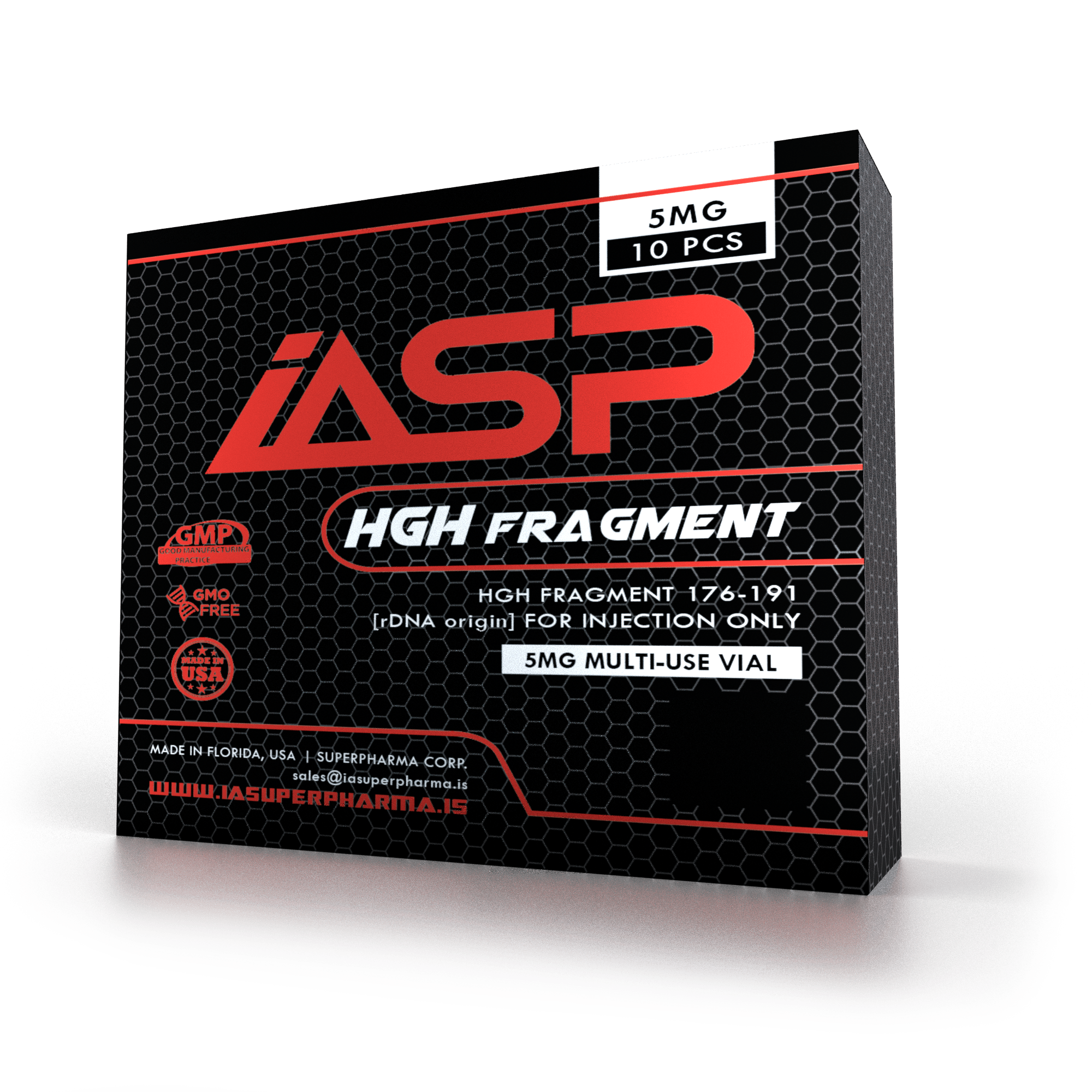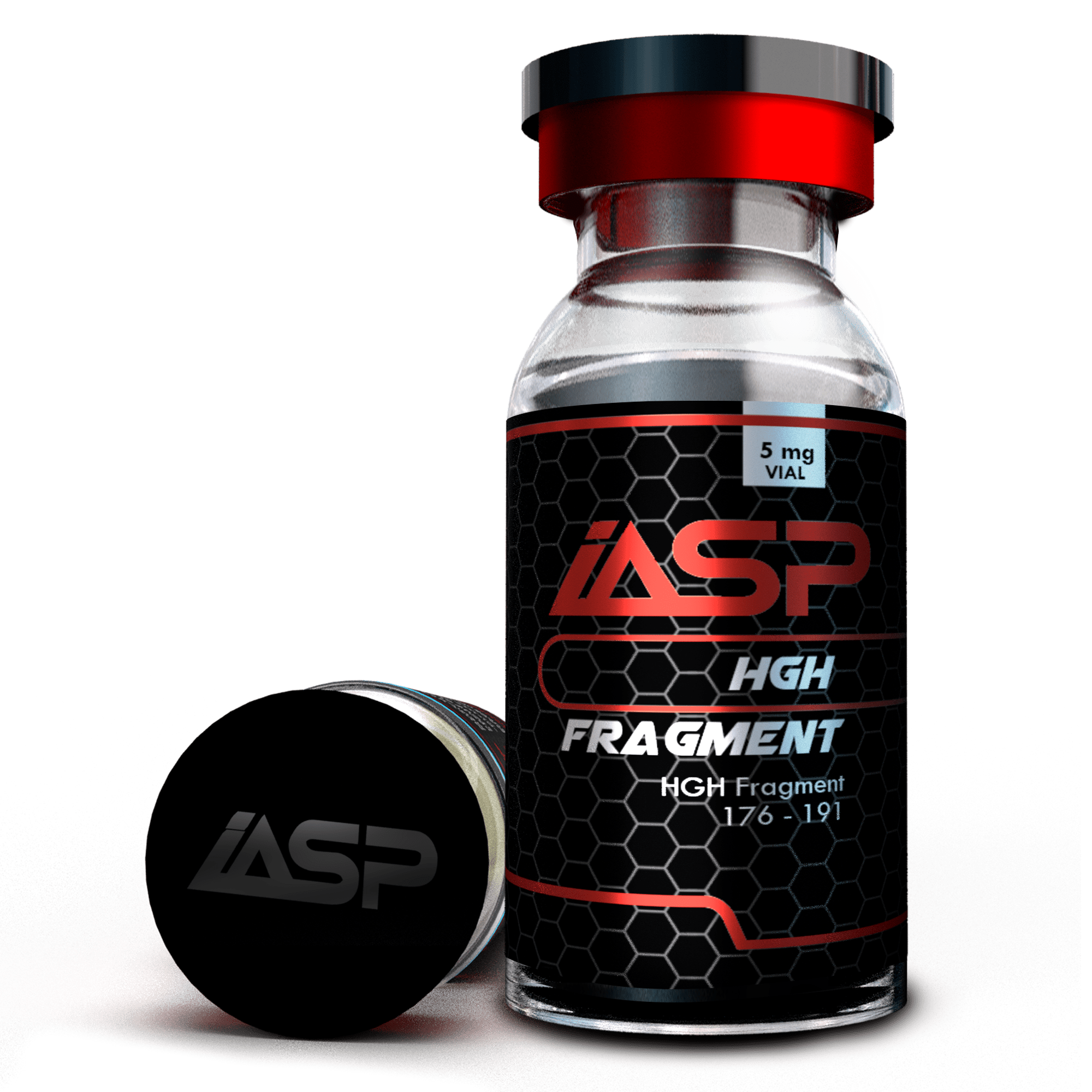This product is a box of 10 vials.
What Is HGH Fragment?
Fragment 176-191 (a modified version of AOD9604) is a small piece of human growth hormone (hGH) that is sometimes called the "lipolytic fragment". Fragment 176-191 earned this name because lab research has shown it to improve fat burning, especially in mice bred to have large fat stores. Fragment 176-191 has been studied a lot in animal models because it keeps the fat-burning effects of hGH but avoids some other effects of the full protein, such as raising insulin-like growth factor-1 (IGF-1) levels, harming carbohydrate metabolism, changing insulin sensitivity, increasing long bone growth, and so on. The targeted effects of fragment 176-191 make it useful for exploring human fat metabolism and may one day provide the basis for developing anti-obesity medications.
Sequence: Phe–Leu–Arg–Ile–Val–Gln–Cys–Arg–Ser–Val–Glu–Gly–Ser–Cys–Gly–Phe
Molecular Formula: C78H123N23O22S2
Molecular Weight: 1799.1 g/mol
CAS Number: 66004-57-7
Lowers Blood Sugar
Research in animals has shown that the c-terminal end of hGH is mainly responsible for the protein's blood sugar-lowering effects. Testing of at least six different fragments from this section of hGH has shown that fragment 176-191 is the most effective synthetic version of hGH for lowering blood sugar levels. This effect comes second to a sustained increase in plasma insulin levels. There is some interest in using fragment 176-191 as a treatment for both prediabetes and type 2 diabetes.
Fat Burning & Weight Loss
Fragment 176-191 has earned the nickname of "lipolytic fragment" because testing in mice has shown the peptide to have strong fat-burning and weight-loss properties. This action is thought to happen through an increase in beta-3 adrenergic receptors (β3-AR or ADRB3). Activating ADRB3 is known to directly boost fat burning in fat tissue and cause heat production in skeletal muscle. Mice genetically changed to make no ADRB3 do not respond to the fat-burning effects of hGH or fragment 176-191.
Studies show that the increased fat burning linked to fragment 176-191 matches up with energy use and thus weight loss, leading to a nearly 50% drop in weight gain in obese animals over a three-week period. Interestingly, the weight loss effects were seen only in obese mice, with lean mice keeping normal body weight on average, even when given fragment 176-191. These findings show that there are backup regulatory paths for fat breakdown that override ADRB3 function when body weight is at or near normal, opening up areas for more research into energy balance.
Cartilage Regeneration
Safety Studies
Though fragment 176-191 is mainly of interest for its fat-breaking properties, the peptide is being studied for other possible benefits. A 2015 article from Korea showed that fragment 176-191 may be able to strengthen the effects of hyaluronic acid injections in promoting cartilage regrowth. Studies in rabbits showed that weekly injections of fragment 176-191 increase lab measures of cartilage growth and that giving the peptide with hyaluronic acid (HA) produces even stronger effects. The study also found that fragment 176-191, both alone and with HA, reduces disability from osteoarthritis. There is hope that this may lead to advanced treatments for osteoarthritis and may even remove the need for surgery in some cases.
There is some concern that using hGH or its versions for weight control may have unwanted side effects. This concern comes from studies of hGH showing that long-term outside use, while boosting lean body mass and cutting fat tissue, can also cause:
- increased insulin resistance,
- diabetes,
- acromegaly,
- cancer,
- hypertension (high blood pressure), and
- edema (swelling).
In 2013, a study in the Journal of Endocrinology and Metabolism looked at six studies of fragment 176-191 to check the rate and seriousness of negative effects from the peptide. The study included only research that followed the randomized, double-blinded, placebo-controlled model of a phase IIb clinical trial to keep the highest standards of evidence. It found that IV and oral use of Fragment 176-191, compared to placebo, led to no changes in:
- physical findings,
- lab measures,
- glucose levels,
- glucose tolerance,
- insulin sensitivity,
- IGF-1 levels, or
- rates of adverse events (like headache).
The results of this combined analysis suggest that fragment 176-191 offers many benefits of hGH without the linked negative (and often serious) side effects. These findings support pushing for regulatory approval to use fragment 176-191 in medical settings, but also give insight into how human growth, fat storage, and energy balance are regulated. These findings make it clear that it is possible to target fat loss without affecting energy balance in other nutrient paths, opening the door for a deeper look at human energy regulation and ways to change it.
It is worth noting that while hGH has muscle-building effects, fragment 176-191 was chosen for its ability to avoid building effects entirely. This is key to ensuring the peptide has targeted fat-breaking effects and does not cause acromegaly or other conditions linked to hGH use. Studies in mice show that fragment 176-191 does not increase cell growth.
Curious about HGH Fragment (176-191)?
Join our Facebook group to engage directly with thousands of others who use this product, and follow our Facebook/IG pages for hot updates and product announcements!




